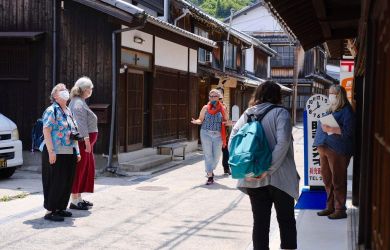
Originally published on metropolis.co.jp on December 2011

MILESTONES
- Railway fans flocked to Tokyo station to witness the initial runs of the new 300kph E5 Series Hayabusa bullet train. Someone even bid ¥385,000 for a ticket.
- A young woman received a kidney from her brain-dead mom, the first case of a family member being prioritized since Japan revised its organ transplant law last year.
- Peace-loving no more: lawmakers say they are rethinking Japan’s long-standing ban on the export of “weapons and related technologies.”
- Takuya Kagata has taken sumo wrestling to the beaches of Japan as executive director of the Nippon Beach Sumo Association.
- Fagiano Okayama defender Ryujiro Ueda scored what is thought to be a world-record 58.6-meter goal with a header during a J. League second division soccer match against Yokohama FC.
- It’s official—Guinness World Records has declared the 634m-tall Tokyo Sky Tree the world’s tallest tower, supplanting the 600m Guangzhou Tower in China.
POST-3/11
- After the devastating earthquake and tsunami that hit Tohoku on March 11, the official number of dead and missing was announced at 19,996 by the Japan Red Cross.
- More than 65 percent of victims of the March 11 earthquake and tsunami were 60 years old or older, with people in their 70s comprising 24 percent of the total.
- TEPCO President Masataka Shimizu went on his knees in Fukushima, apologizing to evacuees. Not satisfied with his apology, one guy yelled, “Get down on the ground!” Shimizu and his lackeys did just that.
- In the largest per person donation from any country, Taiwan offered Japan ¥13.9 billion—¥600 per capita.
- Yomiuri Giants baseball star Alex Ramirez, meanwhile, donated $1 million, as well as sending trucks stocked with medicine to the worst-hit areas.


FURRY FRIENDS
- An 11-year-old cat that “works” as the stationmaster of Kishi station in Wakayama made its TV debut in a commercial for Korean Air.
- A nasty monkey named Lucky, who bit more than 100 folks in Shizuoka last fall, escaped house arrest at a park in Mishima.
- Vets examining the preserved innards of loyal dog Hachiko have determined that the mutt died of cancer, not from swallowing a chicken skewer, as originally thought.
- The first day of a deer cull operation at a mountain forest in Hokkaido turned out a complete failure, despite the involvement of “40 SDF members, two helicopters and 19 vehicles, as well as 35 hunters and 45 [local] officials.”
- Need proof that Japan is cat crazy? A virtual town elected a cat as mayor.
THE BUCKET LIST
- The Ministry of Education, Culture, Sports, Science and Technology will start a program to stop—or at least reduce—youth suicide. About 150 school kids a year take their own lives in Japan.
- An ankle was the latest body part to turn up in an 18-liter container at an Osaka garbage disposal complex. Earlier, two more ankles and a head were found in similar metal containers.
- A young couple died on a beach in Ishikawa Prefecture after their friends dug a deep pit and concealed it with a sheet covered in sand. It was supposed to be a birthday gag, but it all went horribly wrong when the couple fell in headfirst and were suffocated by the loose sand.
- A 74-year-old cabbie was killed when he drove his taxi through a fence in Shinagawa-ku and landed on the Yokosuka Line tracks some eight meters below, where he and his passenger were hit by a passing train.
POLITICS PAYS
- Former Japan PM Yukio Hatoyama received a ¥130 million refund on the ¥610 million he paid in taxes after receiving gifts from his mom.
- After taking heat for accepting a ¥1.04 million donation from a South Korean expat, Prime Minister Naoto Kan agreed to return the money. Political contributions from foreigners are a no-no in Japan.
- After being informed that his ¥17.74 million personal net worth is the lowest among all prime ministers since 1984 financial disclosure laws, Yoshihiko Noda told reporters, “I cannot do anything about the figure.”
- When questioned about her ownership of 1,500 shares of TEPCO stock, newly installed health minister Yoko Komiyama said she inherited them from her father and, anyway, she “has nothing to do with TEPCO.”
RAINING CASH

- Someone left a bag containing ¥10 million in a bathroom in the city hall of Sakado, Saitama Prefecture, along with a note saying that the money was for “the people of Tohoku.” That’s $130,000, folks.
- An anonymous donor left ten randoseru knapsacks worth a total of ¥300,000 at a children’s welfare facility in Maebashi on Christmas Day.
- A group of mystery men from “organizations in western Japan” doled out some ¥30 million in cash in envelopes at several shelters and evacuation sites in Miyagi Prefecture from April 20-23.
- Another nameless benefactor plopped down ¥40 million in a municipal building in Aomori. A note requested that the money be divided among quake-hit prefectures.

SHERRIFF WANTED
- Close to three tons of king crab valued at nearly ¥7 million was pinched from a warehouse in Hokkaido.
- Police in Osaka Prefecture arrested a 26-year-old jobless man who broke both legs of his girlfriend’s two-year-old son because the child had the nerve not to say “itadakimasu” before dinner.
- A 70-year-old man was arrested in Chiba after strangling his 92-year-old mom to death at a cemetery.
- A pair of masked men made off with ¥604 million after strong-arming a dozing security guard at a Tachikawa Post Office depot. It was the biggest cash heist ever in Japan.
- When asked by police if he was involved in the robbery of a Tokyo security company that netted ¥600 million, a 31-year-old gangster replied, “Let me think about it.” He later claimed he spent his cut “at bars and on pachinko.”
- After being arrested for throwing his wife’s corpse in Tokyo’s Oyoko River, a 61-year-old man told police, “There is no doubt I dumped her in the river. I’ll discuss the details later.”
The quake in numbers
- 37.9 Height, in meters, of the tsunami that hit Iwate Prefecture on March 11, according to a University of Tokyo researcher
- 262 Number of aftershocks of magnitude five or greater in the seven days following March 11, according to the Japan Meteorological Agency—
a record - 19.9 Percent of Tokyo-area residents who were unable to return home following the March 11 earthquake, according to a survey by the transport ministry
- 132 Kids in Iwate, Miyagi and Fukushima prefectures whose parents died or remain missing as a result of the March 11 earthquake (as of May 4)
- ¥420 million Amount stolen from ATMs near the crippled Fukushima nuclear plant from mid-March to the end of June, according to the National Police Agency
- 30% Portion of their monthly salaries Diet members agreed to sacrifice for six months following 3/11
- ¥2 billion Amount of money this pay cut would raise
- 1-3% Proposed temporary increase to Japan’s current five percent consumption tax to help offset the rebuilding costs of March 11
- ¥2.5 trillion Extra cash a one-point increase in consumption tax generates per year
- ¥10 billion Amount donated to relief fund by Softbank President Masayoshi Son, the largest donation by an individual
- ¥174 billion Donations received by the Japanese Red Cross for its earthquake relief efforts since March 11. That’s $2.15 billion, folks (as of Jun 2)
- ¥1.85 billion Compensation requested from TEPCO by farmers who suffered huge losses in the Fukushima aftermath
- ¥576 billion Annual loss TEPCO, operator of the crippled Fukushima nuclear power plant, expects for the year ending in March
- 86% Drop in TEPCO shares since March 11
- 44 Foreign ALTs who quit their teaching jobs after the March 11 quake, according to the Council of Local Authorities for International Relations
- 358,000 Foreign visitors to Japan in May, down 50.4 percent and the second largest year-on-year decline
The Year in Numbers
- 600 Number of eruptions detected of Kagoshima’s Mt. Sakurajima so far this year (as of Sep 21)
- 1.92m Amount of snowfall in Kita-Hiroshima on January 15-16, a record
- 30 Percent of Japanese who say they are in favor of ditching the war-renouncing Article 9 of the Constitution
- 100 million Number of people whose personal information was possibly hacked and leaked from online game services provided by Sony worldwide
- 91.1 Percent of new university grads getting jobs at the start of fiscal 2011, down 0.7 of a percentage point from the year before and matching a record-low from 2000
- 24.54 million Registered NTT Docomo mobile phones in the ten prefectures of Tokyo, Kanagawa, Chiba, Saitama, Ibaraki, Tochigi, Gunma, Niigata, Yamanashi and Nagano
- ¥1,200 Average amount of daily spending money Japanese wives give their husbands, according to a survey by Shinsei Financial Co.
- 570,000 Female millionaires in Japan, according to a survey by wealth management consultancy Capgemini
- 27.7% Number of viewers watching the women’s World Cup final in Tokyo at one point during the 3:35am live TV broadcast, according to Video Research Ltd.
- 126,230,265 Japan’s population, down 122,679 from last year (excluding 22 municipalities in Iwate, Miyagi and Fukushima prefectures where registers were lost in the March 11 tsunami)
- 8.66 million Number of Japanese aged 80 or older, the highest total ever, according to the internal affairs ministry
- 195 Whales caught for “research purposes” by Japanese fishermen in this year’s three-month Pacific expedition, according to the fisheries agency
- 591.4kg Weight of the winning entry at the annual giant pumpkin contest in Takikawa, Hokkaido
- ¥18.9 million Price of an 18-karat gold osechi riyori box offered by Takashimaya to mark the department store’s 180th anniversary
- 22. 79 million Smokers in Japan, the lowest number on record, according to Japan Tobacco
- 24,000 Age of human bones found on Ishigaki Island in Okinawa, the oldest ever discovered in Japan
Compiled from reports by AP, Japan Today, The Japan Times, The International Herald Tribune, The Asahi Shimbun, The Mainichi Daily News, Daily Yomiuri, AFP, Reuters and Kyodo





